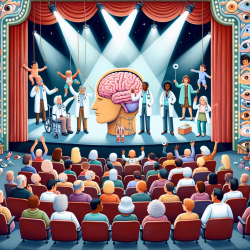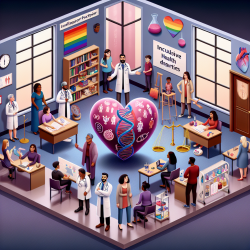The transition from pediatric to adult care is a critical period for young adults with special health care needs. Research consistently shows that suboptimal transitions can lead to preventable complications and a decrease in the quality of care (Cohen et al., 2016; Kingsnorth et al., 2021). A recent study titled Transitions Theatre: An Arts-Informed Interprofessional Education Workshop explores innovative methods to improve this transition through arts-informed interprofessional education (Seko et al., 2022).
The study developed an interprofessional education (IPE) workshop using the readers' theater method, where participants read and discussed scripts based on real-life narratives from young adults and their families. This method is less resource-intensive compared to traditional theater and can be easily adapted to various educational settings.
In the workshop, educators with lived experiences collaborated with academic and clinical educators to design a 1.5- to 2-hour session, conducted virtually due to the COVID-19 pandemic. The session included script reading, small group discussions, and a Q&A with educators who had firsthand experience of transitioning from pediatric to adult care.
The results were promising. Participants reported a significant increase in their understanding of client and family perspectives, their roles in transition support, and interprofessional collaboration. The use of scripts helped participants empathize with the challenges faced by young adults and their families, fostering a more client- and family-centered approach to care.
Key Takeaways for Practitioners
- Empathy and Understanding: The readers' theater method effectively increased participants' empathy towards clients and families, a crucial aspect for any practitioner involved in transition support.
- Interprofessional Collaboration: Understanding the roles of various professionals in a transition team can lead to better coordinated and holistic care.
- Client and Family-Centered Care: The workshop emphasized the importance of considering the multifaceted needs of young clients and their families, going beyond clinical aspects to include vocational, educational, and social needs.
Practical Implementation Tips
- Integrate Arts-Informed Methods: Consider incorporating readers' theater or similar arts-informed methods into your professional development programs to enhance empathy and understanding.
- Foster Interprofessional Education: Create opportunities for practitioners from different disciplines to learn together, focusing on collaborative approaches to care.
- Engage with Lived Experiences: Include educators with lived experiences in your training sessions to provide authentic insights and foster a deeper understanding of client perspectives.
By adopting these strategies, practitioners can significantly improve their skills in supporting young adults during their transition from pediatric to adult care. For more detailed insights, consider reading the original research paper: Transitions Theatre: An Arts-Informed Interprofessional Education Workshop.










